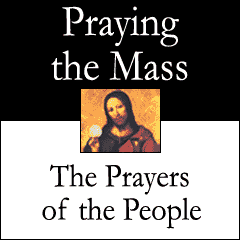At the end of a long string of comments on the posting regarding sola scriptura, Pastor Weedon provides a good precis of the teaching of the early Lutheran Church on the perpetual virginity of Mary, and quotes Luther as saying (regarding infant baptism as an example)
“I did not invent it. It came to me by tradition and I was persuaded by no word of Scripture that it was wrong.”
. He also says, regarding my assertion that his position regarding Scripture and Tradition (Tradition teaches sola scriptura) is contradictory:
I do not see a contradiction at all. Sacred Scripture teaches us the value of Tradition (and also teaches us to distinguish between mere human traditions and apostolic ones); Tradition teaches us that the sacred Scriptures are the sole source for the foundations of Christian dogma because our faith rests upon the revelation made to the Apostles and Prophets and not on any other revelations made to men, regardless of their sanctity. The Scriptures do not derive their authority from Tradition’s witness about them; they derive their authority from being incontrovertibly the Word of God.
Pastor, you say you cannot see the contradiction. Let me lay it out once more for you.
I agree that Scripture is (to the faithful) “incontrovertibly” the Word of God and that their authority does not derive (as a source) from the Tradition but from God himself. The Church, using Tradition as a guide, recognised their authority and which books were and were not authoritative. Thus again, we see the teaching authority of the Church, which is not above that of God’s Word in Scripture, but in the service of God’s Word in Scripture.
The same could be said of Tradition itself: The Church recognises authentic Tradition on its own self-evident nature as witness to the Word of God. For Catholics, this witness is also “incontrovertible”.
We recongise that just as the authority of the Church and Tradition is not “incontrovertible” to non-Catholics, so the authority of Scripture is not “incontrovertable” to non-Christians.
But you say that “Tradition teaches us that the sacred Scriptures are the sole source for the foundations of Christian dogma becasue our faith rests upon the revelation made to the Apostles and Prophets and not on any other revelations made to men.”
Note first: we agree that “our faith rests upon the revelation made to the Apostles and Prophets and not on any other revelations made to men.” What we do not agree upon is that this revelation is completely contained in the written revelation made to the Apostles and Prophets. We point to two ways in which the revelation was passed on: Sacred Scripture and Sacred Tradition.
So where does the “sola” come from? You say it “Tradition teaches” it.
Now, if the Tradition of “sola scriptura” is a “Christian dogma”, then there is a contradiction, for this dogma does not have its foundation in Scripture alone.
Even if it is not a dogma, but a “principle” a difficulty still exists for you: namely that the authority for this principle comes from (one reading of) Tradition. Tradition therefore has a recognised authority as a basis for a theological principle alongside Scripture itself.
The result is that Scripture is no longer the sole authority for the foundation of teaching within the Lutheran Church. Again, a contradiction.
I note in your precis of Lutheran teacing on the perpetual virginity of Mary that Luther said (regarding infant baptism) “I did not invent it. It came to me by tradition and I was persuaded by no word of Scripture that it was wrong.”
That is precisely our point. Luther refers to his own authority as a scriptural interpreter.
How is this any less controversial than our claim that this or that doctrine “came to us from Tradition, and the CHURCH has not been persuaded by any Word of Scripture that it is wrong”?
It is a case of submitting to
1) the Authority of Scripture
2) the Authority of Tradition
3) the Authority of the Church as interpreter of Scripture and Tradition
rather than to
1) the Authority of Scripture
2) the Authority of Tradition
3) my own Authority as interpreter of Scripture and Tradition.
PE has said that the first schema ends in “the Catholic Church, the Catholic Church, the Catholic Church.”
I contend that the latter schema ends in “Me, me, me.”







